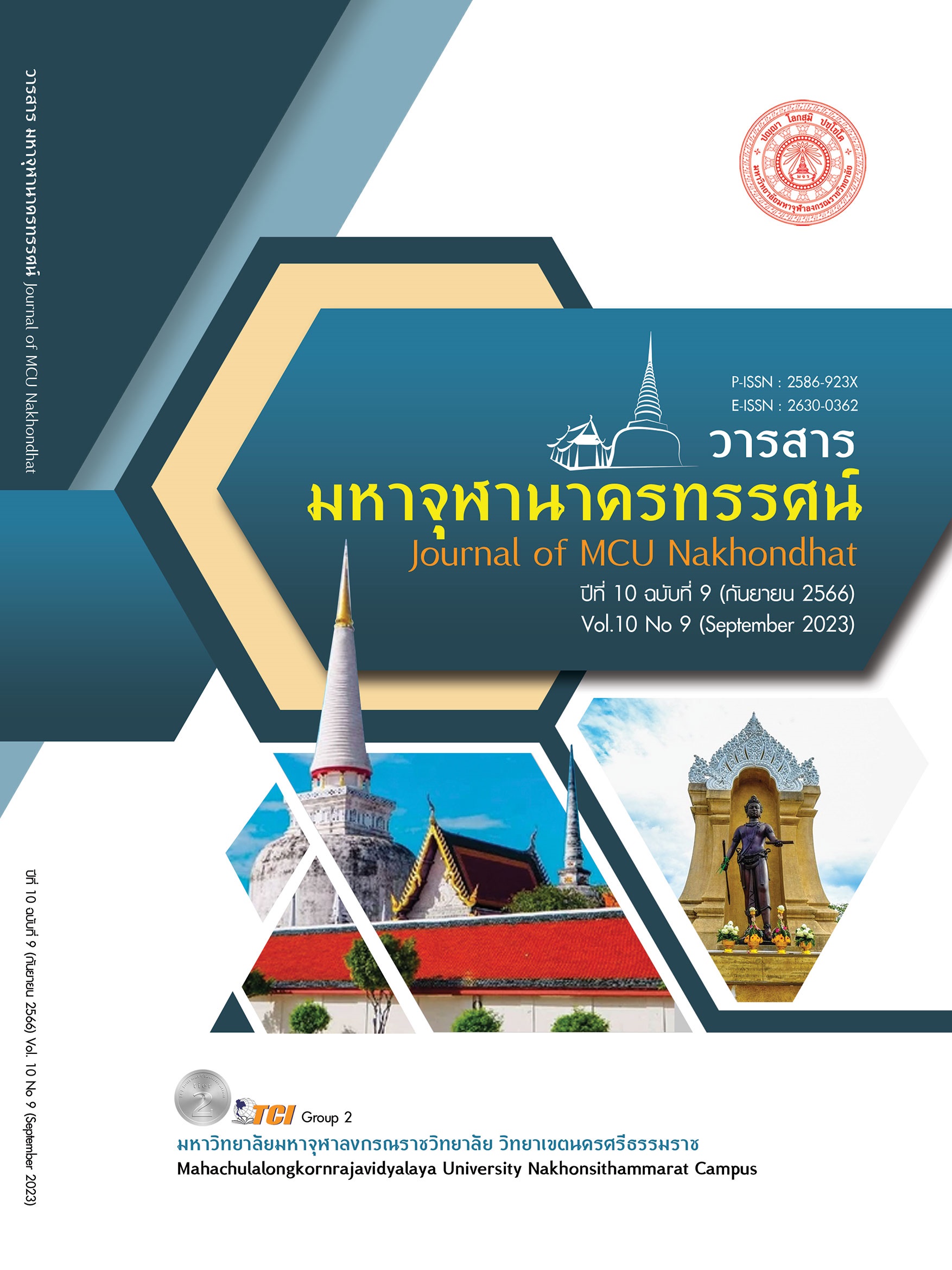THE NEEDS FOR ENGLISH LANGUAGE FOR TOURISM COMMUNICATION AMONG PEOPLE IN CULTURAL TOURISM AT WAT THAT NOI NAKHON SI THAMMARAT PROVINCE
Main Article Content
Abstract
This research article is intended 1) to study the tourism situation of cultural sites Wat That Noi, Nakhon Si Thammarat Province 2) to explore the need to use English for communication tourism of people in cultural communities, Wat That Noi Province Nakhon Si Thammarat Is a qualitative research that collects data by means of interviews from tourists, people in the community, agencies and organizations involved By using structured interviews that have passed precision quality checks By those who have expertise, consider the content and suitability of the language used in the research by checking the index. Consistency Data is analyzed through the theoretical concepts chosen for the study using a three - poster data validation process. To find the answer to the research and analyze the data using descriptive statistics, including the average percentage from the study found that 1) Measuring the least elements Nakhon Si Thammarat province is the tourist attraction is very high. Because it is a famous tourist destination There is a beautiful landscape Clean and safe. SHA standards are received each day. There are tourists who have faith to their father, like verbal rights. Come to travel a lot, especially during long holidays and holidays. All relevant sectors Both the public and private sectors Participate in management, with few weaknesses and problems/The obstacles that have a huge impact on the quota - 19 situation have resulted in very few or almost no tourists, especially foreign tourists. 2) People in the community have English skills for communication, at a low level There is a need to develop English communication skills, in terms of speaking about daily greetings, using video clips
Article Details

This work is licensed under a Creative Commons Attribution-NonCommercial-NoDerivatives 4.0 International License.
References
เอื้อมพร หลินเจริญ. (2555). เทคนิคการวิเคราะห์ข้อมูลเชิงคุณภาพ. วารสารการวัดผลการศึกษา มหาวิทยาลัยมหาสารคาม, 17(1), 18-25.
กฤษณะ โฆษชุณหนันท์. (2564). การเสริมศักยภาพการสื่อสารภาษาอังกฤษของผู้ประกอบธุรกิจท่องเที่ยวเชิงเกษตรเพื่อการประกอบธุรกิจที่ยั่งยืน: กรณีศึกษาจังหวัดปทุมธานี. เรียกใช้เมื่อ 25 พฤศจิกายน 2564 จาก https://urms.rmutt.ac.th/research?pf-w2w23333&rs-v2y21313
กลุ่มงานวิจัยและพัฒนานวัตกรรมการท่องเที่ยวและกีฬา. (2563). รายงานฉบับสมบูรณ์โครงการค่าใช้จ่ายการสำรวจทัศนคติและความพึงพอใจของนักท่องเที่ยวชาวไทยและชาวต่างชาติที่เดินทางท่องเที่ยวในประเทศไทย. เรียกใช้เมื่อ 25 พฤศจิกายน 2564 จาก https://secretary.mots.go.th/ ewtadmin/ewt/policy/ download/article/article_20220607124823.pdf
กาญจนา แสงลิ้มสุวรรณ และศรันยา แสงลิ้มสุวรรณ. (2555). การท่องเที่ยวเชิงมรดกวัฒนธรรมอย่างยั่งยืน. วารสารนักบริหาร, 32(4), 139 - 146.
ดวงใจ กาญธีรานนท์. (2555). แนวทางการส่งเสริมการท่องเที่ยวในประเทศไทยของนักท่องเที่ยว ญี่ปุ่น กลุ่มสตรีวัยทำงาน. ใน วิทยานิพนธ์ปริญญามหาบัณฑิต สาขาวิชาวิทยาศาสตร์การกีฬา. มหาวิทยาลัยจุฬาลงกรณ์.
พิศิษฐ ตัณฑวณิช และพนา จินดาศรี. (2561). ความหมายที่แท้จริงของค่าIOC. วารสารการวัดผลการศึกษา มหาวิทยาลัยมหาสารคาม, 24(2), 3 - 12.
วราพร พูลเกษ และคณะ. (2558). การพัฒนาทักษะการสื่อสาร ภาษาอังกฤษของชุมชนหมู่บ้านโฮมสเตย์ เพื่อเพิ่มศักยภาพการท่องเที่ยว : กรณีศึกษาบ้านโคกโก่ง ตำบลกุดหว้า อำเภอกุฉินารายณ์ จังหวัดกาฬสินธุ์. ใน รายงานการวิจัย. มหาวิทยาลัยเทคโนโลยีราชมงคลอีสาน.
วริศรา บุญสมเกียรติ. (2555). แนวทางการพัฒนาแหล่งท่องเที่ยวเชิงวัฒนธรรมจังหวัดนครศรีธรรมราช: วัดพระมหาธาตุวรมหาวิหาร วัดธาตุน้อยและโบราณสถานวัดโมคลาน. ใน วิทยานิพนธ์ปริญญามหาบัณฑิต สาขาวิชาการจัดการการท่องเที่ยว. มหาวิทยาลัยธุรกิจบัณฑิตย์.
สำนักการท่องเที่ยวและกีฬาจังหวัดนครศรีธรรมราช. (2564). แผนพัฒนาการท่องเที่ยวจังหวัดนครศรีธรรมราช พ.ศ. 2565 - 2570. เรียกใช้เมื่อ 23 พฤศจิกายน 2564 จาก https://nakhonsi.mots.go.th/ewt_dl _link.php?nid-769
องค์การบริหารการพัฒนาพื้นที่พิเศษเพื่อการท่องเที่ยวอย่างยั่งยืน. (2565). การท่องเที่ยวหรืออุตสาหกรรมท่องเที่ยวเป็นเรื่องใกล้ตัวกว่าที่คิด. เรียกใช้เมื่อ 23 พฤศจิกายน 2564 จาก https://tatreviewmagazin e.com/article/community - based - tourism/
Fadel, C. (2008). 21st Century skill: How can you prepare students for the new Global Economy? Global Lead, Education Cisco Systems, Inc. Retrieved November 23 , 2564 , from https://www.oecd.org/site/educeri21st/40756908.pdf
Lumsdon, C. (1999). Motivation and Personnality. (1nd ed.). Bangkok: Xpernet.
Nzama, A.T. et al. (2005). Workbook - I Tourism Workbook for Educators: 2004 Curriculum Statement. In Tourism Workshop Educational. Centre for Recreation & Tourism, UZ. and Tourism KwaZulu - Natal. University of Zululand.


